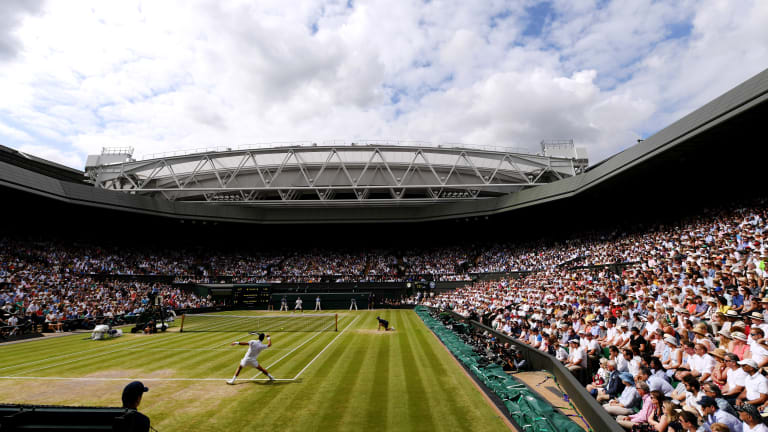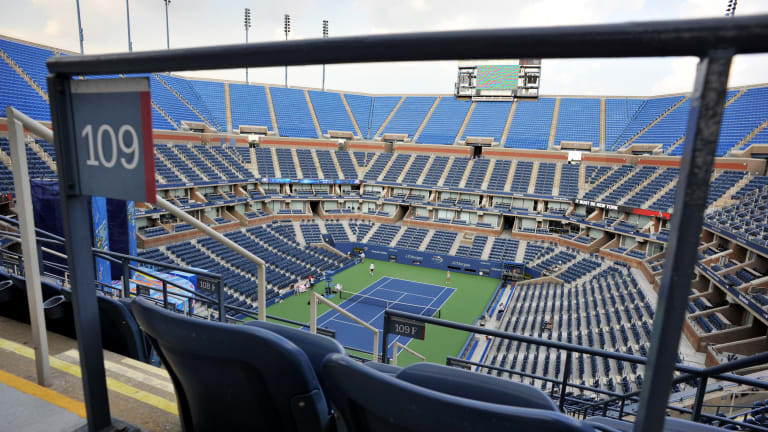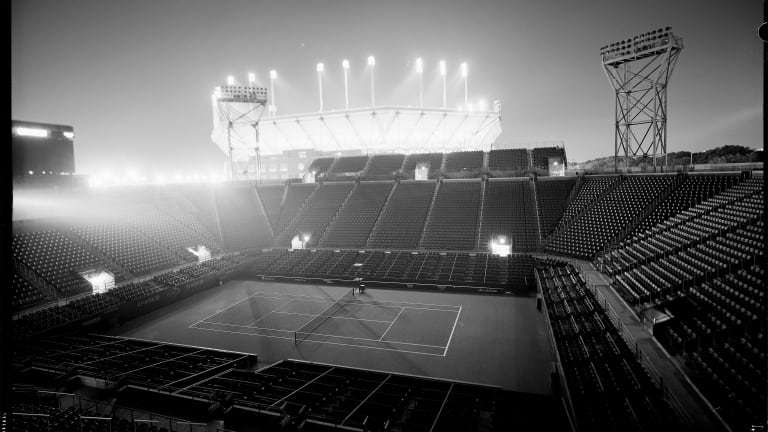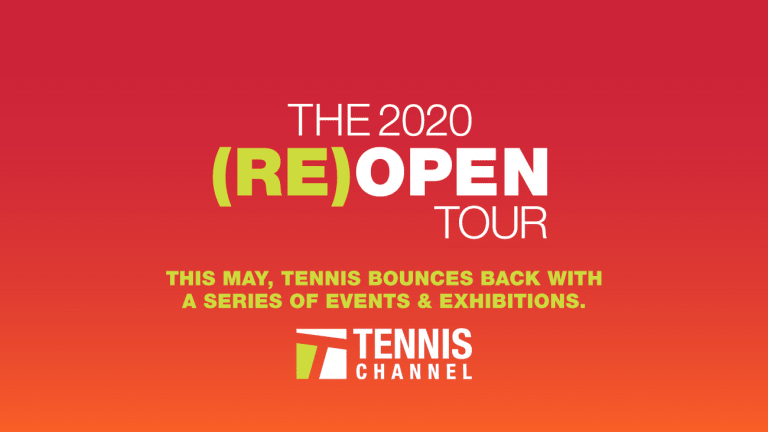Marshall Happer urges ATP and WTA to not rush decision-making process
By Steve Flink May 13, 2020San Diego Open
ATP cancels China swing, including Shanghai Masters, and adds six 250 events to 2022 calendar
By TENNIS.com Jul 21, 2022Australian Open
Pandemic surge hits Australian Open: Bernard Tomic's COVID-19 prediction comes true, spectators capped at 50 percent
By Kamakshi Tandon Jan 13, 2022Australian Open
Novak Djokovic has been exempted—but his stance hasn’t been vindicated
By Steve Tignor Jan 04, 2022Australian Open
Rafael Nadal back on track for Australian Open following COVID-19 case
By Kamakshi Tandon Dec 30, 2021Australian Open
Aussie Open field starts to experience effects of pandemic surge, vaccination issues
By Kamakshi Tandon Dec 21, 2021"It will happen this year": Stefanos Tsitsipas planning to get COVID-19 vaccine
By Kamakshi Tandon Sep 21, 2021US Open
Going to the US Open? Proof of vaccination status now required after change in COVID-19 policies
By TENNIS.com Aug 27, 2021US Open
A vaccinated Sofia Kenin to miss 2021 US Open due to positive COVID-19 test
By Matt Fitzgerald Aug 26, 2021Australian Open
The Rally: if you wanna play a major, you must play by the local rules
Jan 18, 2021Marshall Happer urges ATP and WTA to not rush decision-making process
The former Administrator of the Men's Tennis Council gives his take on the daunting challenges facing the game’s current leaders as they confront the elusive coronavirus.
Published May 13, 2020
Advertising
Serving as Administrator of the Men’s Tennis Council (MTC) from 1981-89, M. Marshall Happer III was arguably the closest the sport has ever come to having a Commissioner. He was the ultimate authority figure of his time. In those days, the MTC was the central governing body of men’s professional tennis. Happer held his crucial post as Administrator, while the MTC was comprised of three player representatives, three from the ITF and three tournament representatives. Known as the Men’s International Professional Tennis Council from 1974-87, the name change to MTC took place in 1988. The notion was “to provide an independent, democratic, international body for the administration of professional tennis.”
The Council disbanded at the end of 1989—much to the dismay of many insiders—and Happer moved on to other significant endeavors in the sport, most prominently a five year stint from 1990-95 as Executive Director, Chief Operating Officer and in-house counsel for the USTA. Given Happer’s wide range of leadership experience—especially his MTC contributions—I wanted to get his take on the daunting challenges facing the game’s current leaders as they confront the elusive coronavirus.
I first asked Happer how he would feel if he was in his old MTC post today trying to figure out what to do about the tennis calendar with so many variables and imponderables to consider. What should be done in these demanding times?
He replied, “When the Men’s Tennis Council was the unified governing body, they would have all worked together to make a decision on what to do. The French Open wouldn’t have changed their dates unilaterally, because the dates were set by the Men’s Tennis Council, so that would have been a non-starter. The Men’s Tennis Council always respected the Grand Slams and treated them with kid gloves. Nobody would have done anything without discussing it with the three constituencies in the context of the Men’s Tennis Council.”
But we are no longer living in that world. How does he imagine the way it might have all played out if the council was still in existence?
“A unified governing body would have to wrestle with it and set the priorities," Happer said. "My guess is that they would decide what is most important for tennis this year and that would be to get the Grand Slams played. And then you would come down from there if you can’t get all four played as we know now with Wimbledon canceled. It would be a nightmare for anybody who did not get their tournament played because a lot of tournaments not held could then go out of business. Their income is from year to year. I think all four governing bodies—the Grand Slam board representing the four Slams, WTA tour, ATP tour and ITF—are talking to each other and working together.”

Marshall Happer urges ATP and WTA to not rush decision-making process
© Getty Images
Advertising
Getty Images
Elaborating on that theme, Happer says, “It is in nobody’s interests to work against the best interests of the sport. Having said that, at some point you have to protect what is most important first and then the next most important. That is how you do the calendar. You start the calendar with the Grand Slam dates and then build everything around that. If you have to move those dates, you try to rearrange everything with the most important thing, giving everybody a chance to have a tennis tournament. There are nine Super-Duper’s [Masters 1000s] on the ATP Tour that seem to be pretty strong financially, but I have heard reports that quite a few of the other tournaments are losing money.”
Happer is a strong advocate for following the science, not only in the world at large but in tennis. He wants everyone to take heed of what the experts are saying.
“I hear all the scientists saying we are going to get another spike in the fall with everybody opening up states prematurely, and it is going to keep going. Tennis is even in worse shape because international travel is dangerous,” he says. “I just don’t know when we will get to any comfort level about traveling internationally. Nobody but Roger, Rafa and Novak is going to be able to fly around in NetJets. Everybody else has got to get on a commercial airline. I believe that is going to be here for a while until we find some sort of vaccination which everybody is telling me is a year-and-a-half away.”
That assessment led us to talk about the Australian Open considering a tournament next year with either no spectators or solely Australian fans, and other strong measures of that sort.
“Anybody that comes into the country goes into a two week exile. With this pandemic you are going to be facing no spectators from outside the country. The players do not wish to get sick. You have got to be able to isolate everybody who is sick until they are not going to infect anybody else. Craig Tiley said he is not sure the players will be able to come to Australia in January,” Happer said.
Would it be wise for the game to shut down totally through 2020 to keep the players safe and then try to see what might be possible for next year?
Happer answers, “Hopefully within a month or two we will begin to get more test facilities and a better way to deal with this. But it is important not to rush these decisions and try to get as much scientific information as possible. The first 5000 people that go to the US Open each year are going in with credentials—ball people, officials, players, the people at the gates, etc. So you have to protect 5000 people even to have a tournament with no spectators.”
The US Open is now more open to holding the tournament this year without any fans. How does Happer feel about that possibility? He says, “If you go to a guy like Jimmy Connors and ask him if he would like to play with no fans, I guarantee you he will say, ‘Hell no. We feed off the adrenaline of the fans.’ But if you go to all of the players who are getting no income this year, you may get a different answer. There is no good answer to any of this. The first thing is to keep everybody as safe and healthy as possible. The second thing is to revive the sport. That’s how I feel about it.”

Marshall Happer urges ATP and WTA to not rush decision-making process
© AFP via Getty Images
Advertising
Getty Images
Meanwhile, there is the lingering talk in the air about merging the ATP and WTA. Does Happer believe that is realistic?
He asserts, “They are not two equal companies. One has a lot of money and the other doesn’t. So just from that standpoint it would be complicated to put them together. Secondly, I don’t think the men would put up with having women representatives on anything related to the men’s tour, and vice versa. Half the people in the world—including a lot of players—think they are still player associations. They are not. They are two joint ventures. I am not as clear about the organization of the WTA, but the ATP Tour is definitely not a player association.”
Having said that, Happer adds, “Maybe Roger has started something by opening the dialogue about merging. I saw that Steve Simon said he is in favor of it and obviously Billie Jean is, as are a lot of the original creators of the WTA. There would be a way to try to put it together. You would probably have to keep some autonomy so that the women voted on the women’s tournament matters, and the men on men’s tournament matters. When they were talking about joint matters they would maybe vote together, or at least negotiate together.”
And yet, Happer is convinced this kind of a merger would be difficult to pull off. Financial considerations would be paramount.
As Happer explains, “You have got the ATP Tour Pension Fund that has got over a hundred million dollars in it. You can’t commingle all of that kind of stuff. I am not so sure tennis is not better off with the four different governing bodies and everybody guaranteed to protect their own turf and their own property. They are able to work together out of necessity with good faith, arms length negotiating contracts among each other.”
Happer pauses briefly, and then adds, “Right after the split in 1990, we had three different officiating certifications and three tennis officials training programs. They solved that problem by putting it together in a mutual situation. Probably the way for the future is to keep the formal organizations separate, but to work together even more than they are doing now. The problem is not the competition between the ATP Tour and the WTA Tour and the Davis Cup. The real problem is getting kids to play tennis instead of soccer or football or basketball. The competition is also with other entertainment events, not competition among the various tennis constituencies.”
With health issues front and center, planning anything now related to the sport is an arduous task. How does the sport protect itself when perhaps 30% of the tournaments might go by the wayside?
Happer replies, “Everybody in tennis will try to work together. The market always determines how many tournaments there will be. Some tournaments could be lost. But hopefully we will get back to international travel.”

Marshall Happer urges ATP and WTA to not rush decision-making process
© Getty Images
Advertising
Getty Images
Having said that, Happer is particularly encouraged about a new development within the USTA that he believes could have very positive ramifications for the sport. He has happily witnessed the emergence of their new Executive Director Michael Dowse in what could be a public reshaping of that role.
“As far as I can tell, Michael is the first Executive Director that has ever been permitted to speak freely to the press on behalf of the USTA,” Happer said. “Up until now, the volunteers would never let the Executive Director do that. They have a guy in Michael who is smart and very good at what he does, and apparently they are letting him speak for and run the USTA. That would be one of the great accomplishments of 2020. It is absolutely terrific for the USTA and the US Open. And if you listen to what Michael is saying during this pandemic, he is not going to do anything stupid.”
The US Open will soon have to reach a decision on whether or not to move forward with the tournament this year. Can they proceed with or without spectators?
“It goes way beyond the players,” Happer said. “You need to be able to test the 5000 people. And then, God only knows about the spectators. I can’t believe we will have enough testing going on and enough control over this. It gets back to the scientists. I know we always had a reserve fund at the USTA to cover one year’s operation. We did it when I was Executive Director, and probably it is still going on now. But the US Open is now generating $300 million and there is probably nothing that can recover that loss. What will happen if they open up New York and the US Open and tell everybody to wear a mask? That’s hard to know.”
Very few individuals in the tennis world know as much about the inner workings of the sport as Marshall Happer. He examines the landscape with a singular clarity of vision and a clear sense of the past. He is neither an optimist nor a pessimist; Happer is above all else a realist.
In closing our conversation, Happer recalled something former professional player and later Executive Director of World Championship Tennis Mike Davies once told him. As Happer mentions in his upcoming book on the history of pro tennis called “Pioneers of the Game”, Davies said long ago that putting tennis governance back together in a unified body (the way it was in the MTC era) would be comparable to “putting the ivory from a piano’s keys back into an elephant’s trunk.”

Marshall Happer urges ATP and WTA to not rush decision-making process